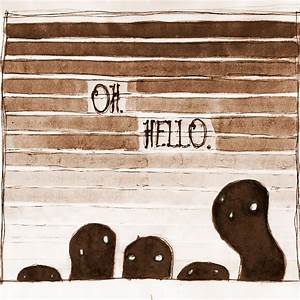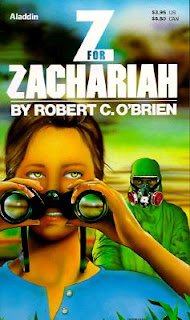Monday Musings: The Art of The Oh Hellos
Ever since I wrote up my ThrowBook Thursday post on Dear Wormwood, I've been somewhat obsessively listening to the entire oeuvre of The Oh Hellos (their Christmas album notwithstanding, because it's Lent/Easter season and I probably won't be back into Christmas/Advent music until at least June). Going through two full albums and three EPs has convinced me of two things. First, I have not given the Oh Hellos' first EP and album enough love in the past. Second, their body of work feels like an extended story that turns back in on itself with new insight.
(Before I get any further, you should check out this handy examination of the Oh Hellos' work by Rachel at Let All Be Wick. She does a fine job summarizing the ideas of each album, and her belief that Boreas will be the next "4 Winds" EP matches mine, but with lyrical support.)
Through the Deep, Dark Valley is unique among the Oh Hellos' albums in that it features a reprise of its opening song. Like Dear Wormwood, the music follows a journey. (Though the mixing isn't quite as solid as on Dear Wormwood and the later EPs; while those albums are mixed (composed, in some cases) in such a way that the songs work best in album order, TtDDV's songs have some stark contrasts that preclude this sort of uniformity of vision. Then again, maybe that's part of the journey through the valley: you're going to stumble over unexpected changes as you go). Before I began obsessing with the Oh Hellos a few weeks ago, I think I'd listened through this album once. I loved "The Lament of Eustace Scrubb" but I didn't think the album had the coherency of Dear Wormwood and didn't feel the need to come back to it.
In going back to it, however, I discovered that there is a thread that carries through the album. There's repentance and experience woven into all of the songs, and you can hear the seeds of Dear Wormwood in this album just as the seeds of this album were in the original EP. The songs range from the Biblical ("Like the Dawn" is a meditation on Adam's first look at Eve and "Wishing Well" feels like a modern take on "The Prodigal Son") to the folksy ("Eat You Alive" and "Second Child, Restless Child"). "Second Child, Restless Child" reads like a more developed version of ideas from "Lay Me Down" on the EP and "I Have Made Mistakes" is an aural sequel to "Hello, My Old Heart."
The first in what is presumed to be a series of four EPs titled after the Greek embodiments of the winds (Notos [South], Eurus [East], Boreas [North], and Zephyrus [West]), Notos moves from the triumphant call to repentance at the end of Dear Wormwood to the mountaintop. But it's not a triumphant mountain. It's a mountain as representative as the valley of the dark night of the soul. The lyrics of "On the Mountain Tall" are concerned with the encounter Elijah had with God, wherein God revealed himself in the still, small voice rather than the big, showy whirlwind or earthquake. That idea of fire carries over into the next song, "Torches," which also introduces the figure of Fortuna (or luck); keep an eye (or an ear) out for her since she's featured in both of the EPs released in this series so far. The EPs carry over some musical tricks from Dear Wormwood, namely the inclusion of musical interludes and the construction that makes these pieces integral to the sound of the songs they surround. "Planetarium Stickers on a Bedroom Ceiling" is one such interlude, leading perfectly into the next song (and my personal favorite on the album), "Constellations." Next we get the titular song, "Notos," which uses the threat of a hurricane as a metaphor for trials and loss. This leads into the second interlude of the EP, "Mandatory Evac/Counting Cars," which echoes "Planetarium Stickers" while carrying over the imagery of "Notos" before giving way to the finale, "New River."
As Notos began with an examination of personal and societal values compared to God's views, Eurus begins with the hard truth that it rains on "the wicked and just all the same". It then moves through "Dry Branches" (our first musical interlude) into "Grow," a song about allowing the wilderness to do its work and "let the river run its course." (One can't help but remember "New River" from Notos and "The Lament of Eustace Scrubb" from Through the Deep, Dark Valley.) Then we get "Eurus," which features the return of "mother Fortuna," who is once again behind the destructive tendencies of the singer and his fellows; it also calls us back to the first interlude with the singer's bones "cracking like a dry branch in a westward wind". But there's hope beyond Fortuna's influence because the "new Arcadia" mentioned in "Grow" seems to have "come around" in the next track, "A Convocation of Fauns (A Faunvocation If You Will)." (Yes, that's the official track name, and it wins my favorite track title ever.) We pass out of that interlude into a pair of songs that carry us back to the beginning of Notos and on into what comes next (Boreas?); "Hieroglyphs" turns outward to address those who are so worried about the afterlife they fail to account for the value of the present one and "Passerine" addresses concerns of personal faith to its object.
Have you listened to any Oh Hellos albums? Which songs (or albums) are your favorites?
(Before I get any further, you should check out this handy examination of the Oh Hellos' work by Rachel at Let All Be Wick. She does a fine job summarizing the ideas of each album, and her belief that Boreas will be the next "4 Winds" EP matches mine, but with lyrical support.)
The Oh Hellos EP
The four songs in this collection serve as a sort of prelude to the full album that follows. "Hello, My Old Heart" is both naive and experienced, digging into the pain of heartbreak and pushing on to what comes after. "Lay Me Down" has a bluegrass/folk sound that serves its lyrics well. "Cold is the Night" demonstrates the lyrical deftness that the Oh Hellos are capable of. "Trees" is a song about relationships and the dissonance between childhood and adulthood captured in the image of climbing trees (a theme and image that return in Dear Wormwood).
Through the Deep, Dark Valley
Through the Deep, Dark Valley is unique among the Oh Hellos' albums in that it features a reprise of its opening song. Like Dear Wormwood, the music follows a journey. (Though the mixing isn't quite as solid as on Dear Wormwood and the later EPs; while those albums are mixed (composed, in some cases) in such a way that the songs work best in album order, TtDDV's songs have some stark contrasts that preclude this sort of uniformity of vision. Then again, maybe that's part of the journey through the valley: you're going to stumble over unexpected changes as you go). Before I began obsessing with the Oh Hellos a few weeks ago, I think I'd listened through this album once. I loved "The Lament of Eustace Scrubb" but I didn't think the album had the coherency of Dear Wormwood and didn't feel the need to come back to it.
In going back to it, however, I discovered that there is a thread that carries through the album. There's repentance and experience woven into all of the songs, and you can hear the seeds of Dear Wormwood in this album just as the seeds of this album were in the original EP. The songs range from the Biblical ("Like the Dawn" is a meditation on Adam's first look at Eve and "Wishing Well" feels like a modern take on "The Prodigal Son") to the folksy ("Eat You Alive" and "Second Child, Restless Child"). "Second Child, Restless Child" reads like a more developed version of ideas from "Lay Me Down" on the EP and "I Have Made Mistakes" is an aural sequel to "Hello, My Old Heart."
Notos
The first in what is presumed to be a series of four EPs titled after the Greek embodiments of the winds (Notos [South], Eurus [East], Boreas [North], and Zephyrus [West]), Notos moves from the triumphant call to repentance at the end of Dear Wormwood to the mountaintop. But it's not a triumphant mountain. It's a mountain as representative as the valley of the dark night of the soul. The lyrics of "On the Mountain Tall" are concerned with the encounter Elijah had with God, wherein God revealed himself in the still, small voice rather than the big, showy whirlwind or earthquake. That idea of fire carries over into the next song, "Torches," which also introduces the figure of Fortuna (or luck); keep an eye (or an ear) out for her since she's featured in both of the EPs released in this series so far. The EPs carry over some musical tricks from Dear Wormwood, namely the inclusion of musical interludes and the construction that makes these pieces integral to the sound of the songs they surround. "Planetarium Stickers on a Bedroom Ceiling" is one such interlude, leading perfectly into the next song (and my personal favorite on the album), "Constellations." Next we get the titular song, "Notos," which uses the threat of a hurricane as a metaphor for trials and loss. This leads into the second interlude of the EP, "Mandatory Evac/Counting Cars," which echoes "Planetarium Stickers" while carrying over the imagery of "Notos" before giving way to the finale, "New River."
Eurus
As Notos began with an examination of personal and societal values compared to God's views, Eurus begins with the hard truth that it rains on "the wicked and just all the same". It then moves through "Dry Branches" (our first musical interlude) into "Grow," a song about allowing the wilderness to do its work and "let the river run its course." (One can't help but remember "New River" from Notos and "The Lament of Eustace Scrubb" from Through the Deep, Dark Valley.) Then we get "Eurus," which features the return of "mother Fortuna," who is once again behind the destructive tendencies of the singer and his fellows; it also calls us back to the first interlude with the singer's bones "cracking like a dry branch in a westward wind". But there's hope beyond Fortuna's influence because the "new Arcadia" mentioned in "Grow" seems to have "come around" in the next track, "A Convocation of Fauns (A Faunvocation If You Will)." (Yes, that's the official track name, and it wins my favorite track title ever.) We pass out of that interlude into a pair of songs that carry us back to the beginning of Notos and on into what comes next (Boreas?); "Hieroglyphs" turns outward to address those who are so worried about the afterlife they fail to account for the value of the present one and "Passerine" addresses concerns of personal faith to its object.
Have you listened to any Oh Hellos albums? Which songs (or albums) are your favorites?







Comments
Post a Comment
What do you think?